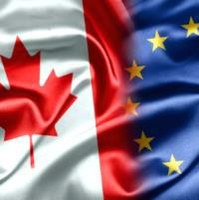
(BRUSSELS) – The EU gave the go-ahead Friday to the landmark economic and trade agreement with Canada (CETA) following resolution of concerns from Belgium’s Wallonia region.
Prime Minister of EU President Slovakia Robert Fico expressed his delight with the decision: “It represents a milestone in EU’s trade policy and our commitment to it,” he said.
The breakthrough has been welcomed by the EU leadership, which sees CETA a standard for future international trade agreements.
EU Parliament president Martin Schulz said: “We are the biggest single market of the world, everybody wants to get access to our market and we want from our market get access to the markets of the other parts of the world, that’s called Globalisation. Globalisation needs rules.”
CETA will remove more than 99% of tariffs that are currently imposed on trade between the EU and Canada. It sets high standards for consumer, environmental and labour protection.
The agreement includes provisions on market access for goods, services, investment and government procurement, as well as on intellectual property rights, sanitary and phytosanitary measures, sustainable development, regulatory cooperation, mutual recognition, trade facilitation, cooperation on raw materials, dispute settlement and technical barriers to trade.
The negotiations with Canada were conducted on the basis of a mandate agreed by the Council in 2009. Following a Council decision in September 2011, talks on investment protection were also started within the CETA framework.
On 5 July 2016, the Commission proposed that the deal be signed and concluded as a “mixed” agreement. This means that on the EU side, it must be signed by both the EU and the member states, and ratified by all relevant national and regional parliaments.
The agreement will be applied on a provisional basis once the European Parliament has consented to its conclusion, pending ratification by all of the member states. Provisional application will concern essentially the provisions of EU exclusive competence.
Strategic partnership agreement
The Council also adopted by written procedure a decision on the signing and provisional application of a strategic partnership agreement between the EU and Canada. This agreement seeks to deepen political dialogue and cooperation on foreign and security policy between the EU and Canada. It will strengthen relations in fields such as human rights, international peace and security, sustainable development and judicial and law enforcement cooperation.
Council decision on the signature of CETA
Council decision on the provisional application of CETA
Comprehensive economic and trade agreement (CETA) between the EU and Canada


